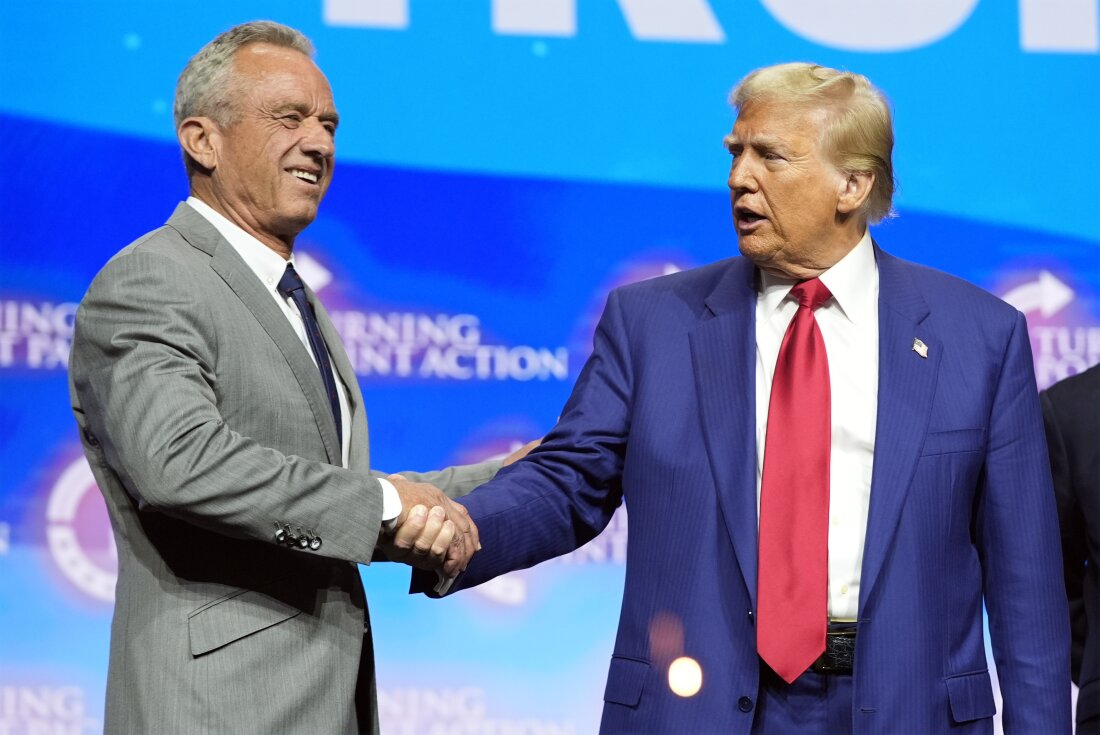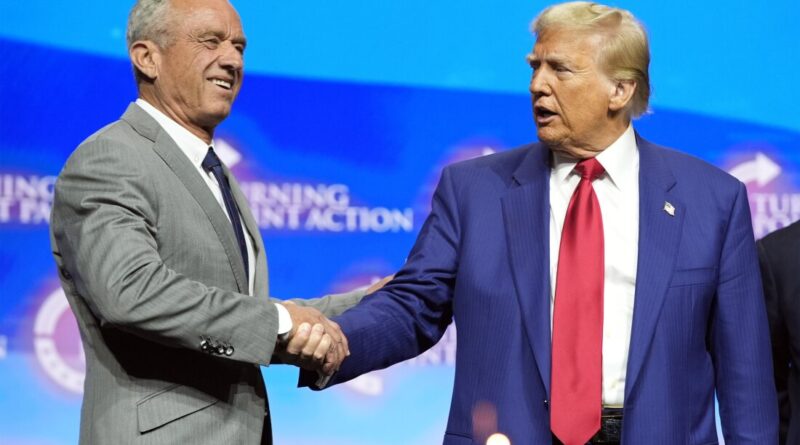How health care could change under the new Trump administration

President-elect Donald Trump shakes hands with Robert F. Kennedy Jr., at a campaign rally in October. Kennedy, a vaccine skeptic, is one of Trump’s health advisers.
Alex Brandon/AP
hide description
toggle caption
Alex Brandon/AP
Former President Donald Trump’s election victory and return to the White House may bring changes that reduce public health insurance programs – an opportunity to increase the free rate, while imposing restrictions innovations in abortion and other reproductive care.
The changes will be felt far from Washington, DC, and could include the erosion of the Affordable Care Act’s consumer protections, the imposition of work requirements on Medicaid and funding cuts to safety net insurance, and challenges to agencies. of government that protects public health.
Abortion restrictions may be enforced nationwide in a possible attempt to prevent the importation of abortion drugs.

And with the rise of vaccine skeptic Robert F. Kennedy Jr. to Trump’s inner advisers, public health deals with strong scientific support – whether fluoridating the public water supply or vaccinating children – could be on fire.
Trump’s success will give a wider platform to skeptics and critics of health programs and actions. Public health officials worry that in a worst-case scenario, the US could see an increase in preventable diseases; weakening public trust in established science; and debunked ideas — such as the link between vaccines and autism — adopted as policy.
Trump said in an NBC News interview on Nov. 3. that he would “make a decision” about banning more vaccines, said he would talk to Kennedy and called him “a very capable young man.”
Here’s what’s known about what the Trump administration might do on several big health care issues:
Changes to Obamacare
Although Trump has said he will not try again to repeal the Affordable Care Act, his administration will face an immediate decision next year on whether to roll back the expansion of enhanced premium subsidies for insurance plans. of Obamacare. In addition to improved subsidies, a sharp increase in premiums is expected to result in a lower number. The current unguaranteed interest rate, around 8%, could rise.
The policy comments did not go far beyond the “planning ideas” Trump said he had during his talks with Harris, though Deputy Vice President J.D. Vance later said the administration would seek to include more competition in ACA markets.
Republicans claimed a majority in the Senate, excluding the White House, while control of the House was undecided as of Wednesday afternoon.
Surveys show the ACA has gained support among the public, including provisions such as protection for preexisting conditions and allowing young people to stay on family health plans until they are 26 years old.
Trump supporters and others who have worked in his administration say the former president wants to reform the law in ways that will cut costs. They say he has shown that he will be strong when it comes to lowering high health care prices, pointing to efforts during his presidency to pioneer medical cost transparency.
“At a lower price, I would see him building in the first term,” said Brian Blase, who served as Trump’s health adviser from 2017 to 2019. fraud and destruction.”
Efforts to weaken the ACA could include reducing enrollment fees, allowing consumers to buy more health plans that do not comply with the ACA’s consumer protections, and allowing insurers to charge more for sick people. higher premiums.
Democrats say they expect the worst.
“We know what their agenda is,” said Leslie Dach, executive chairman of Protect Our Care, a health care policy and advocacy organization in Washington, D.C. She worked in the Obama administration to help implement the ACA. “They’re going to raise costs for millions of Americans, and take millions out of millions, and in the meantime, they’re going to give tax breaks to the rich.”
Theo Merkel, director of the Private Health Reform Initiative at the Paragon Health Center, which is chaired by Blase, said the revised ACA subsidies extended by the 2022 Tax Cuts Act do nothing to improve plans or rates. below. He said they are presenting a paper on the low quality of architecture with large government grants.
Drug price negotiation
Some Trump supporters say the president-elect may support keeping Medicare’s power to negotiate drug prices, another provision of the IRA. Trump has advocated lower drug prices, and in 2020 he advanced a pilot model that would have tied the prices of some drugs to Medicare to lower costs overseas, said Merkel, who served in the House of Representatives. before Trump’s White House. The drug industry successfully sued to block the program.
Leadership of health organizations
Within Trump’s party, other names have been floated as possible leaders for the Department of Health and Human Services. They include former Louisiana Governor Bobby Jindal and Seema Verma, who ran the Centers for Medicare & Medicaid Services during the Trump administration.
Kennedy, who suspended his independent presidential bid and endorsed Trump, told supporters that Trump had promised him control of HHS. Trump said publicly before Election Day that he would give Kennedy a bigger role in his administration, but he may have trouble winning Senate confirmation for a Cabinet position.
Limiting or blocking Medicaid
While Trump has vowed to protect Medicare and said he supports home care funding, he has not made clear his intentions for Medicaid, which provides coverage for low-income and with a disability. Some health analysts expect the program to be vulnerable to spending cuts, which could help fund an extension of the tax break that expires at the end of next year.
Possible changes include imposing work requirements on beneficiaries in other countries. The administration and Republicans in Congress may also try to reform the way Medicaid is funded. Currently, the federal government pays a varying percentage of the program’s costs. The Conservatives have long sought to reduce government grants to states, which analysts say could lead to a sharp reduction in power.
“Medicaid is going to be a big target in the Trump administration,” said Larry Levitt, senior vice president for health policy at KFF, the nonprofit that includes KFF Health News.
Healthy reproductive health
Less clear is the likely future of reproductive health rights.
Trump said decisions about abortion restrictions should be left to states. Thirteen states prohibit abortion with few exceptions, while another 28 prohibit the procedure based on gestational age, according to the Guttmacher Institute, a research and policy organization focused on promoting reproductive rights. Trump said before the election that he would not sign a national abortion ban.
State ballot measures to protect abortion rights were approved in seven states, including Missouri, which Trump won by about 18 points, according to preliminary AP reports. Abortion rights measures were rejected by voters in Florida and South Dakota.
Trump could restrict access to abortion drugs, which are used in more than half of abortions, either by revoking FDA approval for the drug or by upholding a 19th-century law, the Comstock Act , which abortion opponents say prevents their delivery. Trump said in general he would not use the law to stop the smuggling of drugs.
KFF Health News is a national newsroom that produces in-depth journalism on life issues and is one of the main programs operating on KFF.
#health #care #change #Trump #administration
